Institutional Web Management Workshop 2010
This was the 13th Institutional Web Management Workshop [1] to be organised by UKOLN [2] held at the University of Sheffield from 12 to 14 July 2010. The theme was 'The Web in Turbulent Times' [3]. As such, there was a healthy balance of glass-half-empty-doom-and-gloom, and glass-half-full-yes-we-can.
More detailed reporting, including live blogging by Kirsty McGill of T Consult Ltd [4] and blog posts by presenters, can be found at the IWMW Blog [5].
Welcome
Just before the start of the conference, the level of noise seemed low, perhaps because there was a twitterwall of #iwmw10 tweets [6] being projected on the stage. Marieke welcomed us to the conference, then Brian explored the theme of the conference.
Brian turned the clock back to show an early version of the University of Sheffield Web site using the memento Firefox plugin. By show of hands, three delegates indicated that they had attended the first IWMW in 1997. This was when a newly elected Tony Blair talked about 'Education, Education, Education.' Brian said that it is now 'Cuts, Cuts, Cuts.'
What this means for the community is: it needs to be more innovative; focus on efficiency and networking instead of growth; make greater use of centralised shared services; save costs by using commercial services; come to terms with social media; rediscover the community online despite the drop in use of Jiscmail for mutual support.
Sponsors for the event were thanked [7]. These were Jadu, TERMINALFOUR, Statistics into Decisions, Eduserv, and Site Confidence.
The Web in Turbulent Times
Plenary talk by Chris Sexton, Director or Corporate Information and Computing Services, University of Sheffield
Chris highlighted key IT issues which institutions will need to address in the coming years. She expects cuts to hit universities not this year but in the subsequent two years. The issues facing institutions are:
- The only aspect of IT funding which is certain, is that there will be less of it. When discussing IT projects and academics, it is better to think of them as business projects which bring value to the institution.
- In order to reduce costs we should consider backend systems which are shared across a number of institutions.
- New students are fee-paying digital natives who expect 24x7 support and greater mobile availability. However, more availability risks confidentiality and integrity.
- The Digital Economy Act could cause enormous problems, whether institutions have ISP-related or consumer-related responsibilities.
- We need to develop room videoconferencing and server virtualisation to provide our contribution to reducing carbon emissions.
- We need to focus on teaching and learning services. The quality of other services such as outsourced email hosting, will not be as good. Outsourced services will drive innovation and increase risk.
- We need to rethink how we deliver projects so that they take place over weeks and months rather than years.

Chris Sexton, Director or Corporate Information and Computing Services, University of Sheffield
Are Web Managers Still Needed When Everyone Is a Web Expert?
Plenary talk by Susan Farrell, Web Consultant, Susan Farrell Associates
When Susan asked, few of the audience felt that their VC understood the role of the Web team. We are not as valued as librarians, who have chartered status. The main conclusion of this session was that Web teams needed to promote themselves and be seen as part of the solution, not part of the problem:
- We need to communicate the complexity of what we support, as the institution's reputation would suffer without Web management.
- Our roles our indispensible if we put the Web at the heart of the business.
- We can use PR techniques to communicate how we are helping the whole institution.
- We can gain recognition through communities of interests, briefings and committees.

Susan Farrell, Web Consultant, Susan Farrell Associates
Parallel Sessions 1
Delegates could choose one of ten breakout sessions
 I attended an excellent session by Stuart Church (left) from Pure Usability on Usability and User Experience on a Shoestring. He discussed a user-centred philosophy and some useful low-cost tools.
I attended an excellent session by Stuart Church (left) from Pure Usability on Usability and User Experience on a Shoestring. He discussed a user-centred philosophy and some useful low-cost tools.
Other sessions were: A Little Project Management Can Save a Lot of Fan Cleaning; FlashMash; 'Follow us on Twitter'...'Join our Facebook group'; Getting Awesome Results from Data Visualisation; Location Based Services Without the Cocoa; My Superpower is Content Curation. What's Yours? RDFa from theory to practice; Sheffield Made Us – using social media to engage students in the University brand; Stylesheets for mobile / Smartphones.
Social Event 1
Conference Meal

The conference meal on the first day took place at The Edge, University of Sheffield.
HTML 5 (and Friends)
Plenary talk by Patrick Lauke, Web Evangelist, Opera Software ASA
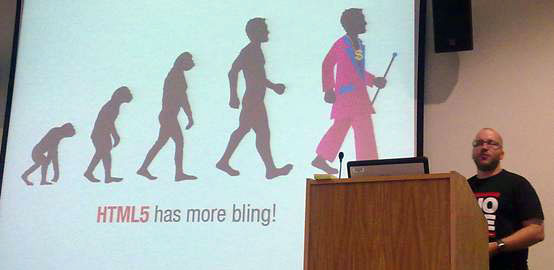
Patrick Lauke expounds on the evolution of HTML
Patrick focussed on what can be done with core HTML5, which is being developed by the Web Hypertext Application Technology Working Group. Unlike XHTML2, HTML5 is backwards-compatible, and works with the realities of browser functionality. According to Ian Hickson, it is for 'extending the language to better support Web applications.' The examples which Patrick gave were:
- New markup elements, which were identified following datamining by Google. These elements include header, footer, article, and nav. They can be used with older browsers with appropriate CSS coding, such as adding {display:block;} and document.createElement.
- Browser-supported client-side form validation can be coded within the HTML, with styling through additional pseudo classes.
- The Video element allows for improved keyboard accessibility and control.
Patrick suggested that when using HTML5, feature detection would be better than browser-sniffing to code with graceful degradation.
Mobile Web and Campus Assistant
Plenary talk by Damian Steer, Web Researcher & Developer, ILRT, University of Bristol and Alex Dutton, Lead Developer, Oxford University Computing Services
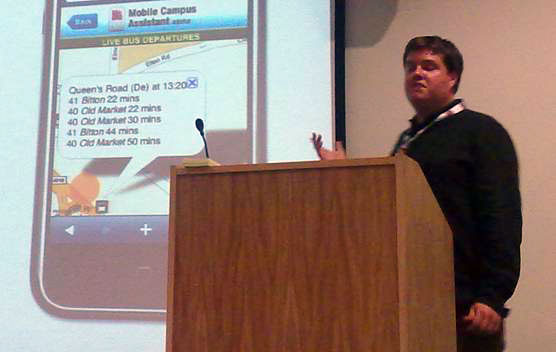
Damian Steer provides a history of mobile phone technology
Damian gave a history of mobile phone technology. He said that webkit is dominant, and that although there are other technologies, consumers are not using them. Useful features are: CSS3 to query screen capabilities; device location detection; offline Web applications capability; orientation and gesture detection. The Mobile Campus Assistant uses time- and location-sensitive information. Their most popular tool is live bus information. Their next project will be My Mobile Bristol.
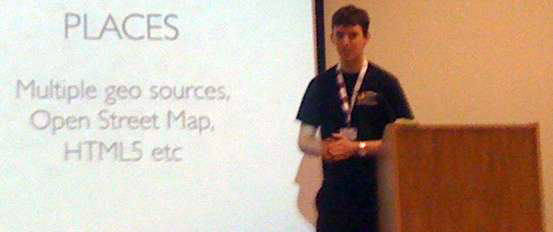
Alex Dutton describes the quick-win mobile applications of Mobile Oxford
Alex talked about Mobile Oxford, which developed quick-win mobile applications: street maps; contacts search; library search; universal search with regex pattern matching; real-time bus, weather and Web cam information. Some of the data used were scraped, and pages could be rendered in different formats, so that third parties can make use of their data. The software is called Molly, and can be downloaded from Sourceforge.
'So What Do You Do Exactly?': In Challenging Times, Justifying the Roles of the Web Teams
Plenary talk by Ranjit (SiD) Sidhu, Founder, Statistics into Decisions
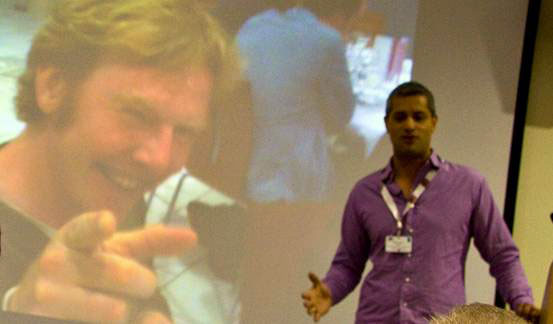
Ranjit (SiD) Sidhu justifies the roles of Web teams
Sid concluded that the challenge for Web teams is to show value. In order to show value, context must be included. A Web site may be expensive, but context is needed to determine what value it brings to the institution.
As institutional Web sites are both e-commerce and informational, we can learn from both types of site. The importance of PDF downloads was demonstrated by looking at how brochures feature on a car Web site. PDF downloads provide more value than posted prospectuses which in turn provide more value than contacting the institution in person. Sid then showed a demonstration dashboard page which he produced by feeding XML data into InDesign. This is a single-page visual report which could be sent to management which shows month-on-month and year-on-year data, statistics, highlights, and recommendations.
No Money? No Matter: Improve Your Web Site With Next to No Cash
Plenary talk by Paul Boag, User Experience Consultant, Headscape
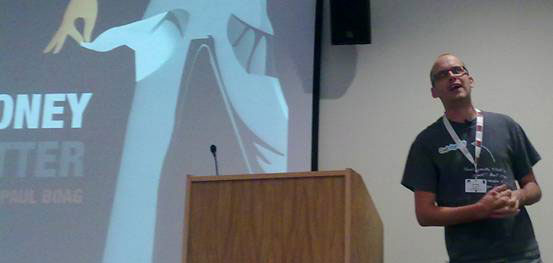
Paul Boag explaining how to cut the Web site cloth according to one's pocket
Paul sees cuts as an opportunity to simplify the service and approach things differently.
He suggested that the service needs simplifying because Web sites are bloated. If there is less money, then smaller Web sites are required. This can be done by three methods: remove content; hide content by removing from navigation and search so it no longer needs maintaining; and shrinking content. This can be implemented by embracing supporting policies such as: the link on the home page with the fewest clicks will be replaced; un publish pages with few views; un publish un reviewed pages.
Suggested methods to approach things differently were: a more agile approach with one month sprints for projects; bringing in an outside perspective; monthly strategic meetings.
It's All Gone Horribly Wrong: Disaster Communication in a Crisis
Plenary Talk by Jeremy Speller, Director of Learning & Media Services, University College London
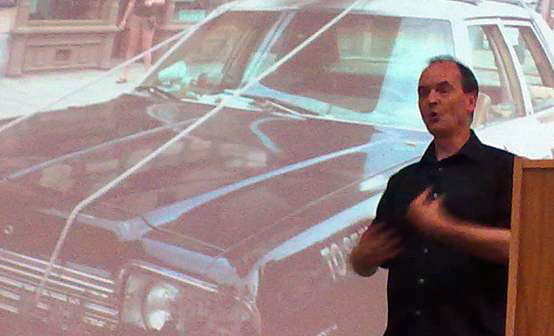
Jeremy Speller advocates the direct involvement of Web teams in disaster management
Jeremy Speller drew on his experiences in 2005, when the 7/7 London bombings took place during the Institutional Web Management Workshop. During the London bombings, the Web and phone service came down, so the only way to get news was through television.
All institutions have a major incident plan, but the Web team is not always fully involved in the team responsible for such a plan. Jeremy recommended that they should be. Jeremy showed a map of different forms of communication and explored the appropriateness of each. An example was given of twitter being used to communicate with students during snowy weather last winter. Jeremy also looked at Web services hosted on third parties, on the Janet network, or co-located at other institutions. Different services are required depending on service availability. If nothing is functioning, the institution should have a megaphone available.
We remembered the UCL victims of the bombing: Gladys Wundowa, Lee Harris, Miriam Hyman and Neetu Jain.
BarCamps
There were two BarCamp sessions and an Online BarCamp [8].
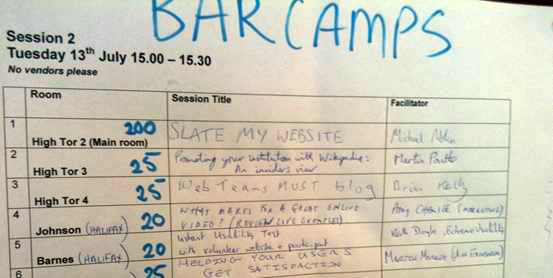
High-tech geo-locational data for the Workshop's two BarCamps
BarCamps Session 1
I attended a session by Helen Sargan from the University of Cambridge on dallying with Plone one year on. Other sessions included: An Insight Into Website Quality Assurance and Enterprise Search; Client Update and Feedback Session; Course Finders and Beyond; Making Your Site Mobile-Friendly.
BarCamps Session 2
I ran a session called 'instant usability testing – let's do it!'. I ran a usability test, including selection, preparation, test and review, in 25 minutes.
Other sessions included: Apache Wookie & W3C Widgets; Helping Your Users Get Satisfaction; Promoting Your Institution with Wikipedia – an insider's view; Slate My Website; Web Teams Must Blog; What Makes For a Great Online Video? – review live examples.
Online BarCamp
This session focussed on the Online Course Prospectus
Parallel Sessions 2
Delegates could choose one of nine sessions on day two.
 I presented a session on 'Developing Your Contingency Plan: Beat the Panic.' In the session, we looked at ways of creating and analysing choices, creating a vision, and qualities which are useful for making change.
I presented a session on 'Developing Your Contingency Plan: Beat the Panic.' In the session, we looked at ways of creating and analysing choices, creating a vision, and qualities which are useful for making change.
Other sessions were: Course Advertising and XCRI; Designing, Developing and Testing a Location-aware Learning Activity Using QR Codes; Engagement, Impact, Value: Measuring and Maximising Impact Using the Social Web; Inside the Pantheon: A Dreamweaver framework for managing dynamic content; Looking at Linked Data; Mobile Apps vs Mobile Web; Taxonomy – Creating structure across content using metadata; Wordpress beyond Blogging.
Social Event 2
Drinks reception at the Kelham Island Industrial Museum

Rapper dancers at the drinks reception.
Doing the Day Job
This session consisted of three shorter plenary talks and then a panel session with those who had just given talks.
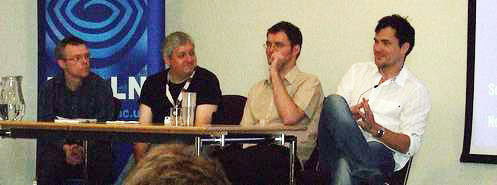
Conducting their panel session are: (left to right) James Lappin, Peter Gilbert, Richard Brierton and Josef Lapka
Replacement CMS: Getting It Right and Getting the Buy-In
Talk by Richard Brierton, Internet Services Manager, University of Sheffield
Richard's talk was informed by his experiences of upgrading a CMS to a completely new version. Often a CMS is blamed for problems, but really any problems are the responsibility of the Web team. He listed his department's CMS ethos as:
- Deliver a CMS for the 90% non-technical users;
- One voice - use consistent terminology;
- Training is the most cost-effective way to improve your Web site;
- Content is the most expensive part of the system;
- Your CMS design should cater for users who will best-guess if unsure;
- Avoid unnecessary flexibility – remove non-essential and counter-productive features;
- Editor's don't care about the CMS – only about their content.
StudentNET Portal
Talk by Josef Lapka, Senior Web Applications Developer, Canterbury Christ Church University
Josef gave a live demo of a student portal system which is the home page for students on campus. Once created, it is very easy for the developers to create new widgets to add new functionality. Some content is forced on students, but mostly students can choose which widgets to display on their home page. The system allows granular messaging to students. It features drag-and-drop functionality, students can check their data and modules, RSS feeds can be added, there is contextual help for each application.
The Impact of SharePoint in Higher Education
Talk by James Lappin, Records Management Consultant and Trainer, Thinking Records and Peter Gilbert, SharePoint Evangelist, University of the West of England
90% of Universities have SharePoint. It is mostly being used for: staff administration using its collaborative tools; and for academic research because it is easier to allow access to third parties than for VLEs. The advantages of SharePoint are that it is good for committees and that it can be used to develop solutions without the skills of a developer. It can be useful for short or external courses. However, there is a steep learning curve, and MySite is designed for people in businesses. Forms can be created using InfoPath, and there is a workflow tool called Skelter which is simpler than SharePoint's.
Panel Session
With Richard Brierton, Josef Lapka, James Lappin and Peter Gilbert
The panel answered questions from the audience.
Conference Conclusion
Workshop conclusions facilitated by Brian Kelly, UK Web Focus, UKOLN
Brian and others summarised some of the sessions. Brian also demonstrated some fascinating mashups. This included a Twitter buzzword bingo. The following points were made:
- Christine Sexton's blog is worth seeing [9]
- Results of the QR code game were announced
- Some innovative tools:
- Brian asked everyone to write one blog post a week as a community resource which could be accessed from the IWMW Community [13]
- He also highlighted the press release for the event [14], and encouraged us to write our own press releases.
- Brian showed us a version of the presentation videos with twitter subtitles [15]
Brian talked about whether the IWMW would be held again, if the format would need to change, and the need to explore sponsorship.
Author Conclusion
There was a good turnout for the conference, and I enjoyed it as much as previous conferences I have attended in 2005, 2006 and 2007. There was a mixed mood of 'doom and gloom' at the prospect of cuts, and enthusiasm for innovations and new ways of working. I have commented from the perspective of someone attending the conference, but there were live online activities happening too. People not attending the conference could: watch the main sessions live on the Internet; take part in twitter discussions; take part in an online BarCamp.
From talking with conference participants, I sensed that people valued the conference for providing them with enthusiasm and motivation. At the same time, there was realism about the changes which will need to be made in the economic climate and people were ready to return to their institutions with a clearer sense of the importance of strategy.

Health warning at opening of IWMW10 Workshop
References
- Institutional Web Management Workshop 2010 http://iwmw.ukoln.ac.uk/iwmw2010/
- UKOLN http://www.ukoln.ac.uk/
- "This year's event sees the Web Management community, like others in the HE sector, facing turbulent times: we have the uncertainty of the forthcoming general election, the implications of cuts across the public sector, the concerns raised by global warming and even, more recently the effect of erupting volcanoes on northern Europe"
http://iwmw.ukoln.ac.uk/iwmw2010/ - T Consult Ltd http://tconsult-ltd.com/
- IWMW 2010 Blog http://iwmw.ukoln.ac.uk/blog/2010/
- Twitterwall.me http://twitterwall.me/%23iwmw10
- Institutional Web Management Workshop 2010: Sponsors
http://iwmw.ukoln.ac.uk/iwmw2010/sponsors/ - Institutional Web Management Workshop 2010: BarCamps
http://iwmw.ukoln.ac.uk/iwmw2010/barcamp/ - Christine Sexton's blog http://cicsdir.blogspot.com/
- Twapper Keeper - "We save tweets" - #hashtag - iwmw10 - IWMW 2010 tweets
http://twapperkeeper.com/hashtag/iwmw10 - Summarizr http://summarizr.labs.eduserv.org.uk/?hashtag=iwmw10
- IWMW synoptic http://iwmw-rdf.ukoln.info/
- Institutional Web Management Workshops: The IWMW Community
http://iwmw.ukoln.ac.uk/community/search - IWMW 10: Community Press Release: UK Universities Web Managers Are Prepared for Cuts
http://bit.ly/iwmw10pressrelease - iTitle: IWMW10: The Web in Turbulent Times with Twitter Subtitles
http://www.rsc-ne-scotland.org.uk/mashe/ititle/v/id/13314385/
Author Details
Keith Doyle worked in further and higher education for a total of 13 years. He has been Web Content Architect at the University of Salford and Web Master at Manchester College of Arts and Technology (now The Manchester College). Since leaving Salford in 2008, Keith has worked in the private sector, and is now self-employed. Keith's technical interests are in user experience - in particular in Web site navigation, information architecture and live usability testing.
